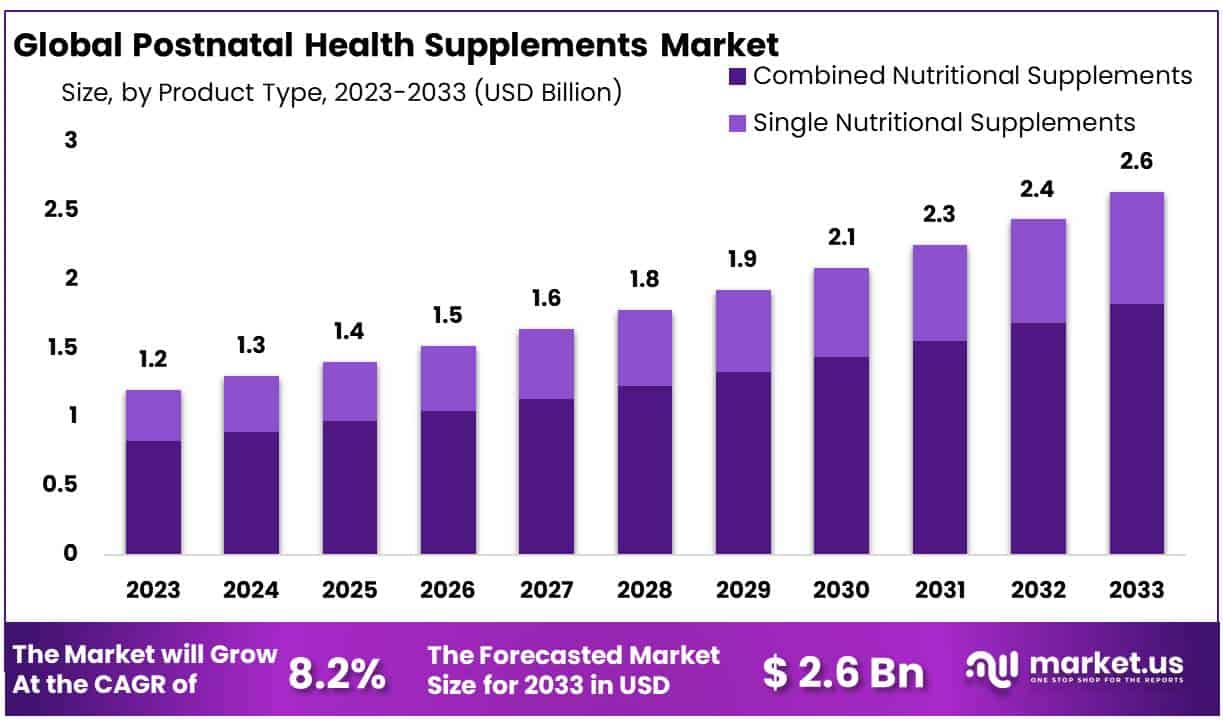Table of Contents
Overview
New York, NY – Sep 30, 2025 – The Global Postnatal Health Supplements Market size is expected to be worth around USD 2.6 Billion by 2033 from USD 1.3 Billion in 2024, growing at a CAGR of 8.2% during the forecast period from 2024 to 2033.
A new line of Postnatal Health Supplements has been launched to address the critical nutritional needs of mothers during the recovery phase after childbirth. The range has been formulated with scientifically supported ingredients to promote energy restoration, hormonal balance, lactation support, and immune strength.
The postnatal period is widely recognized as one of the most vulnerable stages for women’s health. Nutritional gaps during this time can lead to fatigue, mood imbalances, and weakened immunity. The newly introduced supplements include multivitamins, omega-3 fatty acids, probiotics, and herbal support blends, offering a comprehensive solution for holistic maternal care.
Each formulation contains essential nutrients such as iron, calcium, vitamin D, and folic acid, along with carefully selected botanicals traditionally used to improve vitality and emotional stability. This combination ensures both physical recovery and psychological well-being for mothers.
A spokesperson for the launch highlighted, “The health of mothers after childbirth is a cornerstone for family wellness. These supplements have been carefully developed to deliver safe and effective nutritional support, empowering women in their journey of recovery and nurturing.”
Manufactured under stringent quality and safety standards, the supplements guarantee purity and efficacy. They are now available through leading pharmacies, healthcare retailers, and online platforms, ensuring convenient access for families seeking reliable postnatal care solutions.

Key Takeaways
- Market Size: Global Postnatal Health Supplements Market size is expected to be worth around USD 2.6 Billion by 2033 from USD 1.3 Billion in 2024
- Market Growth: The industry is anticipated to expand at a compound annual growth rate (CAGR) of 8.2% between 2025 and 2033.
- Product Type Analysis: Single nutritional supplements accounted for the largest share, representing 69% of the global market in 2023.
- Form Analysis: Capsules and tablets emerged as the leading format, securing 39% of the market share.
- Application Analysis: General well-being and lactation support remained the dominant application areas, collectively holding 34% of the market share.
- Sales Channel Analysis: Pharmacies and drug stores represented the primary distribution channel, capturing 35% of overall sales.
- Regional Analysis: Asia Pacific led the global market in 2023, contributing 38.8% of total revenue.
Regional Analysis
Germany continues to represent the most lucrative market within Europe, driven by a surge in research and development initiatives. These efforts are enabling the introduction of innovative products tailored to evolving consumer demands, thereby strengthening the country’s position in the regional market.
Asia Pacific maintained market leadership in 2023, accounting for 38.8% of the global share. The dominance of this region is attributed to factors such as a growing birth rate, the expansion of the young population base, and heightened awareness regarding the importance of postnatal health supplements. These dynamics are expected to further accelerate regional growth over the forecast period.
North America is projected to witness robust expansion in the coming years. This growth is supported by increasing concerns surrounding post-pregnancy health among women, alongside rising maternal mortality rates in the United States. Growing awareness of these challenges has emerged as a critical driver, fueling demand for postnatal health supplements across the region.
Frequently Asked Questions on Postnatal Health Supplements
- What are postnatal health supplements?
Postnatal health supplements are specialized nutritional products designed to support mothers after childbirth. They help restore essential nutrients, promote hormonal balance, strengthen immunity, and aid lactation, ensuring physical recovery and emotional well-being during the postpartum period. - Why are postnatal supplements important?
Postnatal supplements are important because childbirth depletes key nutrients in a mother’s body. These supplements replenish vitamins, minerals, and omega fatty acids, helping reduce fatigue, support bone health, stabilize mood, and enhance overall recovery for long-term maternal wellness. - What nutrients are commonly included in postnatal supplements?
Most postnatal supplements contain iron, calcium, vitamin D, folic acid, and omega-3 fatty acids. Many also include probiotics and herbal extracts to improve digestion, immunity, lactation, and emotional health, addressing the comprehensive needs of postpartum mothers effectively. - Are postnatal health supplements safe?
Yes, postnatal supplements are generally considered safe when taken as recommended. They are formulated under strict quality standards, but new mothers are advised to consult healthcare professionals before use to ensure suitability for individual health conditions. - Which product type dominates the market?
Single nutritional supplements dominate the postnatal health supplements market, accounting for nearly 69% share in 2023. Their popularity is driven by targeted health benefits, affordability, and widespread availability through pharmacies, drugstores, and digital healthcare retail platforms. - Which region leads the global market?
The Asia Pacific region leads the global postnatal health supplements market, with 38.8% share in 2023. This leadership is supported by increasing birth rates, rising disposable income, and growing awareness of the importance of maternal nutrition.
Conclusion
The postnatal health supplements market is poised for significant expansion, supported by rising awareness of maternal wellness and increasing demand for scientifically formulated products. With a market value projected to reach USD 2.6 billion by 2033, growth is being driven by strong adoption across Asia Pacific, robust R&D activity in Europe, and increasing health concerns in North America.
Single nutritional supplements, capsules, and tablets continue to dominate product demand, while pharmacies and drug stores remain the leading distribution channels. Overall, the sector demonstrates strong potential, reflecting growing recognition of postnatal health as a vital component of long-term family well-being.
Discuss your needs with our analyst
Please share your requirements with more details so our analyst can check if they can solve your problem(s)



